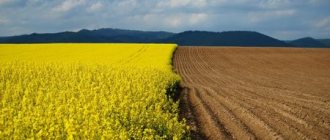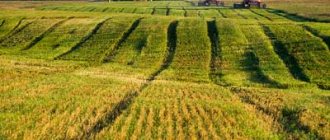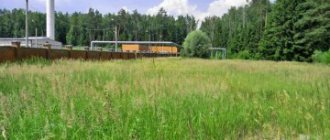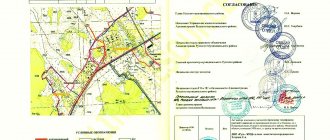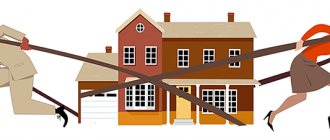Is it possible to build a house on agricultural land?
Relatives have a large plot of land, which they only partially use. When my husband and I decided to build a country house, they suggested that we divide this land so that we could build on our own part of the plot. At first I was happy, but when we started looking at the documents, it turned out that this was agricultural land, with a permitted type of activity - gardening and horticulture. Now we are at a loss... Is it possible to build a house on agricultural land? Do I need to draw up any special documents for this? And if not, is it possible to change something?
Agricultural land for gardening
The category of agricultural land usually includes territories located outside rural or urban settlements. The main purpose of such plots is the cultivation of agricultural crops, as well as meeting agricultural needs.
The state determines several key types of permitted use of land plots. This information is presented in the Land Code of the Russian Federation; the territory of agricultural production must be used within the framework of the target principle - this is mandatory. Horticultural plots are classified as the most popular types of land properties that are used.
You can purchase land not only for legal entities, but also for individuals. If desired, each owner can purchase land from the state after it has been leased.
Types of permitted use of land for gardening:
- You can grow nursery products, ornamental varieties of crops and vegetables;
- Cultivate mycelia (mushrooms) for further processing of the crop;
- Grow shrubs and fruit trees;
- Plant and care for walnut trees;
- Plant vineyards, berry and fruit-bearing bushes;
- Grow seeds to further increase the maximum yield of gardens;
- Grow fruits to later produce drinks;
- Arrange areas with spices.
It is allowed to use land plots for the purposes of gardening and vegetable gardening, with one condition - compliance with the target principle of exploitation of state lands. After the land is leased, a citizen can acquire ownership rights and become the full owner of the territory.
CONSTRUCTION OF A RESIDENTIAL HOUSE ON AGRICULTURAL LAND
Many potential buyers of land plots allocated for dacha farming (construction) are put off by the fact that these lands belong to the category of agricultural land and, in this regard, supposedly fall under some kind of special control. The answer to these doubts is given by Article 1, Paragraph 2 of the Federal Law “On the turnover of agricultural lands”, which states: “the effect of this law does not apply to land plots provided from agricultural lands to citizens for individual housing, garage construction, personal subsidiary and dacha construction farming, horticulture, livestock farming and gardening, as well as land plots occupied by buildings, structures, and structures. The turnover of these land plots is regulated by the Land Code of the Russian Federation.”
What can be done in such areas?
On a private plot of land located within the boundaries of a settlement, a citizen can:
- Build housing and service buildings, if there is permission to do so. In this case, generally accepted standards must be observed: sanitary and hygienic, fire safety, construction.
- Can grow agricultural crops.
- Raise livestock and poultry.
- Set up an apiary.
In a residential building built on a site, it is possible to register at the place of residence and receive a property tax benefit.
The allotment is registered, you can immediately start farming. Private household plots do not require registration. In order to be able to receive subsidies from the state, private household plots are registered with local autonomous authorities. There they will keep a household register for him. To register you must provide the following documents:
- identification document of the owner;
- passports of all family members who have them;
- permits for running private household plots.
According to the citizen, the following data is entered into the household ledger:
- about family members living together;
- about the area of the site;
- about the number of livestock and poultry;
- number of hives;
- availability and number of agricultural machinery and vehicles.
This is done at the time of registration. In the future, this is done annually, when visiting farms by a commission composed of members of the local autonomy, as of July 1. On other dates, the walk-through may be initiated by members of the private household plot.
Basic Rules
- It is prohibited to carry out construction work in areas allocated for personal subsidiary farming.
- At your summer cottage you can simply relax or grow fruit trees, flowers, and vegetables. You can also build a residential building here, but you will not be able to register in it. In order for registration to be possible, the dacha must be transferred to housing stock.
- Land allocated for farming can be occupied by one owner or several, if the land is registered as shared ownership.
- On lands for livestock farming, you can graze livestock and prepare feed for them. It is also allowed to build premises to house animals.
Before purchasing a plot, you should carefully check what types of activities it is intended for and what activities are prohibited on it. Land in the agricultural category differs in its types of permitted use; not always a plot from this category can be used for growing grain or for building an elevator.
What VRIs exist for agricultural land plots?
Despite its name, agricultural land has a wide range of opportunities for its owners.
The permitted use of agricultural land is determined by the VRI ZU Classifier and allows citizens and organizations to fully realize their business and agricultural ideas and eco-fantasies.
Thanks to the VRI classifier, namely the fact that it covers all kinds of activities that can be carried out on agricultural lands, the following types of activities can be carried out :
- implementation of agricultural activities by enterprises;
- creation of personal or farm enterprises;
- growing vegetable and fruit crops;
- creation of dacha, horticultural or gardening partnerships;
- growing and breeding animals, insects and fish;
- research activities, etc.
All agricultural lands according to the types of permitted use can be divided into two categories .
These are lands on which:
- Residential construction is allowed (Codes according to the VRI Classifier 1.16, 13.1-13.3.);
- It is prohibited to build residential buildings, but the construction of permanent buildings is allowed with the obligatory receipt of a construction permit and non-capital ones without obtaining it (codes according to the VRI Classifier 1.0-1.15, 1.17, 1.18).
The most popular types of permitted use of agricultural land for private construction are:
- “Gardening” (code 13.2),
- “Maintaining a dacha farm” (code 13.3).
“ Gardening ” – lands most often included in horticultural communities. Allows owners to grow:
- vegetables,
- fruits,
- melons,
build:
- seasonal and residential garden houses,
- auxiliary buildings.
Registration in such housing is prohibited, but “On Gardening and Vegetable Farming” on January 1, 2021, Also, with the entry into force of this law, all dacha lands will become horticultural.
“ Maintaining a dacha farm ” - the land plot can be used for the same purposes as in the previous paragraph. A significant difference is the possibility of registration only by court decision after the permanent building is recognized as residential and meets all sanitary requirements and safety standards.
Dacha and garden plots may belong to the category of land in populated areas. There are several ways to find out which category your land plot belongs to, the simplest is by cadastral number. Read about which category of land is more suitable for construction in this article.
Despite the fact that the new VRI ZU Classifier came into force back in 2015,
not all landowners brought their land title documents into compliance
.
If your cadastral passport contains VRI from the old land classifier, which currently no longer exists, do not be upset.
Such a document is valid, and the types of permitted use specified in it can be applied.
If you wish, you can change the VRI to a new one by checking with the local administration about the planning of the given territory .
Scroll
To determine the full range of possible types of permitted use of agricultural land, it is enough to refer to the VRI ZU Classifier.
- Activities aimed at growing plant crops (codes 1.1-1.6). It involves the construction of outbuildings necessary for the implementation of the full cycle of agricultural production.
- Activities related to breeding and growing livestock products, poultry farming, and feed production (codes 1.7-1.11). It is permissible to construct capital and non-capital buildings for keeping livestock , poultry, fur-bearing animals, etc., as well as auxiliary buildings necessary for storing and processing production products (dairy, slaughterhouses, feed storage facilities, farms, etc.).
- Fish farming and beekeeping (codes 1.12-1.13). For successful activities, it is necessary to place utility and auxiliary buildings and structures (beehives, honey collection points, artificial ponds for raising young fish, etc.);
- Activities related to scientific support of the agro-industrial sector (code 1.14). This includes work on the study, development and expansion of the agricultural sector, as well as the selection of plants and animals. Allowed construction of field and research laboratories, auxiliary and outbuildings.
- Activities related to the storage and processing of agro-industrial products (code 1.15). The construction of real estate necessary for primary and advanced processing and storage of crop and livestock products is permitted.
- Personal subsidiary plot (code 1.16). On the lands of private household plots (field plot), the construction of any non-permanent buildings (without a foundation) required by the landowner is allowed.
- Nurseries (code 1.17). Involves the construction of buildings necessary for carrying out activities related to the cultivation and sale of seedlings or seeds of plant crops.
- Activities related to production support of the agro-industrial complex (code 1.18). It involves the construction of technical buildings to ensure the full operation of agricultural equipment, its storage and maintenance of proper condition.
- Activities related to vegetable gardening, horticulture and dacha farming (codes 13.1-13.3). It is allowed to use the land plot in full accordance with the needs of the landowner (growing plants, recreation, etc.), as well as the construction of all necessary residential and utility buildings (except 13.1).
Terms and restrictions
In addition to the fact that agricultural land must be used in strict accordance with the VRI, there are additional conditions and restrictions on its use:
- legal – determined by the legal regime of the territory on which agricultural land is located;
- environmental – due to the requirements of environmental protection of land and environmental protection;
- agrotechnical – due to the need to preserve soil fertility;
- special.
It is also important to consider that all types of uses of agricultural land can be
divided into three groups
.
- Basic VRI - are established in strict accordance with the Classifier and the intended purpose of the areas.
- Conditionally permitted - determined by urban planning regulations in accordance with the conditions of the PZZ for a specific territory.
- Auxiliary - are not predominant for the selected plot of land, they are aimed at ensuring the functioning of the main VRI.
The Federation Council proposed equalizing the rights of SNT and rural areas
Thus, there are two organizational and legal forms of partnerships of real estate owners created for the purpose of conducting this activity. These are horticultural and vegetable gardening non-profit partnerships. The rules for their formation are prescribed.
7. You can build a residential or garden house without obtaining a building permit on a garden plot, and you cannot build any house on a garden plot, but if before January 1, 2021 you registered ownership of a capital structure and previously it was allowed to build it - then use it for your health.
4. Buildings that are listed in the Unified State Register of Legal Entities and documents as “residential” or “residential structure” are recognized as residential buildings.
Houses (buildings) that are listed in the Unified State Register of Legal Entities and documents as “non-residential”, seasonal or auxiliary use, intended for recreation and temporary stay of people, are recognized as garden houses. Replacing previously issued documents or making changes to documents or the Unified State Register is not required, but can be done at will.
20. Now the chairman and the board can be elected not for 2 years (as before), but for any period established by the charter, but not more than 5 years.
Requirements have been established for the size of the board - at least three people and should not exceed five percent of the total number of members of the partnership. Now the chairman has the right to issue powers of attorney exclusively without the right of substitution.
13. Added the possibility of transferring public property (roads, power grid facilities, water supply, communications and other facilities) into state ownership of a constituent entity of the Russian Federation or municipal entity.
1) last name, first name, patronymic (the latter - if available), details of identification documents of the owners of land plots located within the boundaries of the gardening or truck farming territory, into whose common shared ownership property of common use is transferred;
3. On the issues specified in paragraphs 4 - 6, 21 and 22 of part 1 of this article, decisions of the general meeting of members of the partnership are made taking into account the voting results of the persons specified in part 1 of article 5 of this Federal Law, who voted on these issues in the manner established this Federal Law.
Author of the publication Lawyer, Subscribe Publication rating:
“On the conduct of gardening and vegetable gardening by citizens for their own needs and on amendments to certain legislative acts of the Russian Federation”
No. 217-FZ dated July 29, 2017 (as amended by Federal Law No. 340 dated August 3, 2018) (hereinafter referred to as “No. 217-FZ”) the legislature changed all essential conditions for the creation/operation and interaction with citizens of gardening partnerships .
Please note that the new law on gardening partnerships will come into force on January 1, 2021 in accordance with clause 1 of Art. 55 No. 217-FZ. In this article I will outline the most important changes that this document makes in the lives of summer residents and other landowners.
